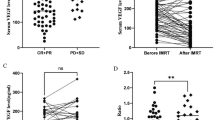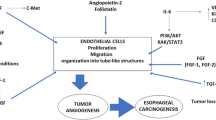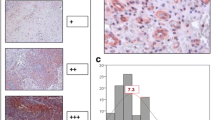Abstract
Background
The correlation between vascular endothelial growth factor (VEGF) and prognosis for patients with esophageal squamous cell carcinoma (ESCC) is controversial. This study investigated the correlation of VEGF expression with distant metastases and prognosis in resectable ESCC to improve the identification of patients with increased risk of postoperative metastases.
Methods
Data from two centers were used to establish a training cohort (n = 319) and a validation cohort (n = 164). Tissue microarrays were generated for immunohistochemical evaluation. The correlations among VEGF expression, clinicopathologic variables, and prognosis were analyzed. The outcomes generated from the training cohort then were tested using the validation cohort. Multivariate analyses were used to test the independent factors that had an impact on postoperative distant metastases, overall survival (OS), and distant metastasis-free survival (DMFS).
Results
Tumor stages, tumor cell grade, and VEGF expression were prognostic factors independent of ESCC outcome. The data indicated that high levels of VEGF expression were correlated with a high risk of postoperative distant metastases (p = 0.013) in the training cohort. This result was confirmed by the validation cohort (p < 0.01) and logistic regression analyses. A high level of VEGF expression also was correlated with poor DMFS (p = 0.011) and OS (p = 0.033) in the training cohort, which also was confirmed by the validation cohort and Cox regression analyses.
Conclusions
Expression of VEGF is a predictor of distant metastasis, OS, and DMFS in resectable ESCC patients. Using a combination of VEGF expression, tumor stages, and tumor cell grade, identification of patients with increased risk of postoperative metastases may become possible.


Similar content being viewed by others
References
Lee PC, Mirza FM, Port JL, et al. Predictors of recurrence and disease-free survival in patients with completely resected esophageal carcinoma. J Thorac Cardiovasc Surg. 2011;141:1196–206.
Wijnhoven BP, Tran KT, Esterman A, Watson DI, Tilanus HW. An evaluation of prognostic factors and tumor staging of resected carcinoma of the esophagus. Ann Surg. 2007;245:717–25.
Law S, Wong J. Changing disease burden and management issues for esophageal cancer in the Asia-Pacific region. J Gastroenterol Hepatol. 2002;17:374–81.
Rice TW, Blackstone EH, Rusch VW. 7th edition of the AJCC Cancer Staging Manual: esophagus and esophagogastric junction. Ann Surg Oncol. 2010;17:1721–24.
Nguyen DX, Massague J. Genetic determinants of cancer metastasis. Nat Rev Genet. 2007;8:341–52.
Chiang AC, Massague J. Molecular basis of metastasis. N Engl J Med. 2008;359:2814–23.
Hanahan D, Weinberg RA. Hallmarks of cancer: the next generation. Cell. 2011;144:646–74.
Png KJ, Halberg N, Yoshida M, Tavazoie SF. A microRNA regulon that mediates endothelial recruitment and metastasis by cancer cells. Nature. 2012;481:190–4.
Kim KJ, Li B, Winer J, Armanini M, Gillett N, Phillips HS, Ferrara N. Inhibition of vascular endothelial growth factor-induced angiogenesis suppresses tumour growth in vivo. Nature. 1993;362:841–4.
Pencheva N, Tran H, Buss C, Huh D, Drobnjak M, Busam K, Tavazoie SF. Convergent multi-miRNA targeting of ApoE drives LRP1/LRP8-dependent melanoma metastasis and angiogenesis. Cell. 2012;151:1068–82.
Liu L, Lin C, Liang W, et al. TBL1XR1 promotes lymphangiogenesis and lymphatic metastasis in esophageal squamous cell carcinoma. Gut. 2014. doi:10.1136/gutjnl-2013-306388.
Dawson MR, Duda DG, Fukumura D, Jain RK. VEGFR1-activity-independent metastasis formation. Nature. 2009;461:E4–5.
Lin C, Song L, Liu A, et al. Overexpression of AKIP1 promotes angiogenesis and lymphangiogenesis in human esophageal squamous cell carcinoma. Oncogene. 2014. doi:10.1038/onc.2013.559.
Choi JY, Jang KT, Shim YM, et al. Prognostic significance of vascular endothelial growth factor expression and microvessel density in esophageal squamous cell carcinoma: comparison with positron emission tomography. Ann Surg Oncol. 2006;13:1054–62.
Ogata Y, Fujita H, Yamana H, Sueyoshi S, Shirouzu K. Expression of vascular endothelial growth factor as a prognostic factor in node-positive squamous cell carcinoma in the thoracic esophagus: long-term follow-up study. World J Surg. 2003;27:584–9.
Kimura Y, Watanabe M, Ohga T, Saeki H, Kakeji Y, Baba H, Maehara Y. Vascular endothelial growth factor C expression correlates with lymphatic involvement and poor prognosis in patients with esophageal squamous cell carcinoma. Oncol Rep. 2003;10:1747–51.
Kozlowski M, Naumnik W, Niklinski J, Milewski R, Dziegielewski P, Laudanski J. Vascular endothelial growth factor C and D expression correlates with lymph node metastasis and poor prognosis in patients with resected esophageal cancer. Neoplasma. 2011;58:311–9.
Liu P, Chen W, Zhu H, et al. Expression of VEGF-C correlates with a poor prognosis based on analysis of prognostic factors in 73 patients with esophageal squamous cell carcinomas. Jpn J Clin Oncol. 2009;39:644–50.
Tzao C, Lee SC, Tung HJ, et al. Expression of hypoxia-inducible factor (HIF)-1alpha and vascular endothelial growth factor (VEGF)-D as outcome predictors in resected esophageal squamous cell carcinoma. Dis Markers. 2008;25:141–8.
Okazawa T, Yoshida T, Shirai Y, et al. Expression of vascular endothelial growth factor C is a prognostic indicator in esophageal cancer. Hepatogastroenterology. 2008; 55:1503–8.
Rosa AR, Schirmer CC, Gurski RR, Meurer L, Edelweiss MI, Kruel CD. Prognostic value of p53 protein expression and vascular endothelial growth factor expression in resected squamous cell carcinoma of the esophagus. Dis Esophagus. 2003;16:112–8.
Cavazzola LT, Rosa AR, Schirmer CC, et al. Immunohistochemical evaluation for P53 and VEGF (vascular endothelial growth factor) is not prognostic for long term survival in end stage esophageal adenocarcinoma. Rev Col Bras Cir. 2009;36:24–34.
Cheng JC, Graber MS, Hsu FM, et al. High serum levels of vascular endothelial growth factor-A and transforming growth factor-beta1 before neoadjuvant chemoradiotherapy predict poor outcomes in patients with esophageal squamous cell carcinoma receiving combined modality therapy. Ann Surg Oncol. 2014;21:2361–8.
Yoon MS, Nam TK, Lee JS, et al. VEGF as a predictor for response to definitive chemoradiotherapy and COX-2 as a prognosticator for survival in esophageal squamous cell carcinoma. J Korean Med Sci. 2011;26:513–20.
Sun ZG, Wang Z, Zhang M. Correlation between vascular endothelial growth factor C expression and prognosis in patients with esophageal squamous cell carcinomas after Ivor-Lewis esophagectomy. Asia Pac J Clin Oncol. 2012;8:e68–76.
Yang HX, Feng W, Wei JC, et al. Support vector machine-based nomogram predicts postoperative distant metastasis for patients with oesophageal squamous cell carcinoma. Br J Cancer. 2013;109:1109–16.
Liang Y, Hou X, Cui Q, et al. Skp2 expression unfavorably impacts survival in resectable esophageal squamous cell carcinoma. J Transl Med. 2012;10:73.
Hou X, Li Y, Luo RZ, Fu JH, He JH, Zhang LJ, Yang HX. High expression of the transcriptional co-activator p300 predicts poor survival in resectable non-small cell lung cancers. Eur J Surg Oncol. 2012;38:523–30.
National Comprehensive Cancer Network Esophageal Cancer Panel (2014) NCCN clinical practice guidelines in oncology, esophageal cancer. V.1. http://www.nccn.org/professionals/physician_gls/f_guidelines.asp. Accessed 14 July 2014.
Acknowledgment
We thank Dr. T.-S. Zeng from the Department of Information and Computational Science, School of Mathematical Sciences, South China Normal University for helping us with data processing. This work was supported by the Fundamental Research Funds for the Central Universities in China (11ykpy59, 13ykzd27), the Guangdong Provincial Science and Technology Planning Foundation (2011B031800179, 2012B031800280, 2013B021800147), the Guangzhou Science and Technology Planning Foundation (201300000191), the Guangdong Esophageal Cancer Institute Science and Planning Foundation (M201401), and the State Scholarship Fund of the China Scholarship Council (201306385029).
Disclosure
The authors have no conflict of interest to disclose.
Author information
Authors and Affiliations
Corresponding author
Electronic supplementary material
Below is the link to the electronic supplementary material.
Rights and permissions
About this article
Cite this article
Hou, X., Wei, JC., Fu, JH. et al. Vascular Endothelial Growth Factor is a Useful Predictor of Postoperative Distant Metastasis and Survival Prognosis in Esophageal Squamous Cell Carcinoma. Ann Surg Oncol 22, 3666–3673 (2015). https://doi.org/10.1245/s10434-015-4390-x
Received:
Published:
Issue Date:
DOI: https://doi.org/10.1245/s10434-015-4390-x




